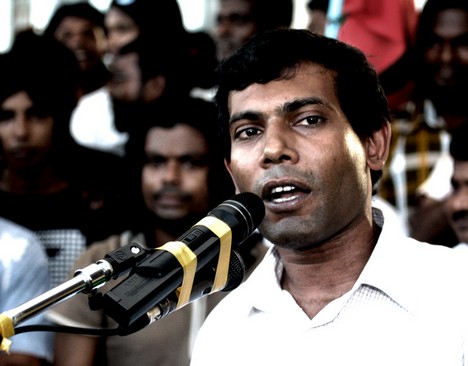Maldives President says melting glaciers can result in serious conflicts
 New Delhi, Oct 23 : Maldives President Mohamed Nasheed said on Friday that fast melting of glaciers in future could lead to serious conflicts arising due to large-scale migration of people in search of dry land and resources.
New Delhi, Oct 23 : Maldives President Mohamed Nasheed said on Friday that fast melting of glaciers in future could lead to serious conflicts arising due to large-scale migration of people in search of dry land and resources.
Speaking at a seminar on `Environment and Conflict Resolution', in New Delhi, Nasheed said melting of glaciers would lead to lack of dry land, forcing people to jump borders and run around looking for land and resources for settling down, giving rise to conflicts which would affect the developing countries more than the rich nations.
"There will be a serious issue of refugees and people will be crossing borders, running around from place to place, unable to settle down on dry land. We are talking about lack of dry land and people will move to wherever there is land and there is resources and livelihood available.
We are talking about billion or so people, especially around India and in South Asia and Asia that will have to be moving from place to place. Now if you will agree with me that it won''t be the rich countries that will have a bigger problem with the refugee issues but more so in developing countries," he said.
Supporting India in its bid for a permanent seat in the United Nations Security Council (UNSC), Nasheed said if India was deemed fit to take steps for climate change, then it should get a representation in the UNSC as well, as climate change was set to emerge as bigger threat than Islamic radicalism or piracy.
""India needs to be in the Security Council. There should be reform in the Security Council. If everyone is asking the Indians to do all sorts of things because of climate change. That of course is the serious security issue.
And therefore I believe that India should be represented and Brazil... developing countries should be permanently represented in the Security Council because this is going to be more serious threat to international order than Islamic radicalism or piracy or resource sharing," Nasheed added.
Appreciating the efforts of Rahul Gandhi, General Secretary of Congress party, he said, there was need to strengthen local governance in order to deal with the conflicts in a better way.
Nasheed has been expressing serious concern over climate change and global warming for some time and to draw attention to the risk his country faces from the rising sea levels and climate change. He held a cabinet meeting at the bottom of the Indian Ocean on October 17 to highlight the issue.
Nasheed and his 12 cabinet ministers donned scuba gear and dove 3.5 metres (11 feet, 6 inches) under the surface of a turquoise lagoon to hold what is billed as the world''s first underwater cabinet meeting.
Rising sea levels of up to 58 cm, as predicted by the U. N. Inter-governmental Panel on Climate Change, threaten to submerge most of the Maldives'' low-lying islands by 2100.
Environment ministers from across the world aim to sign in December a pact to extend or replace the Kyoto Protocol, but advance talks are mired in complex drafts and suspicion between industrialized and developing nations.
The Kyoto Protocol, the first phase of which ends in 2012, obliges 37 rich nations to cut emissions by an average of five percent below 1990 levels by 2008-12. (ANI)